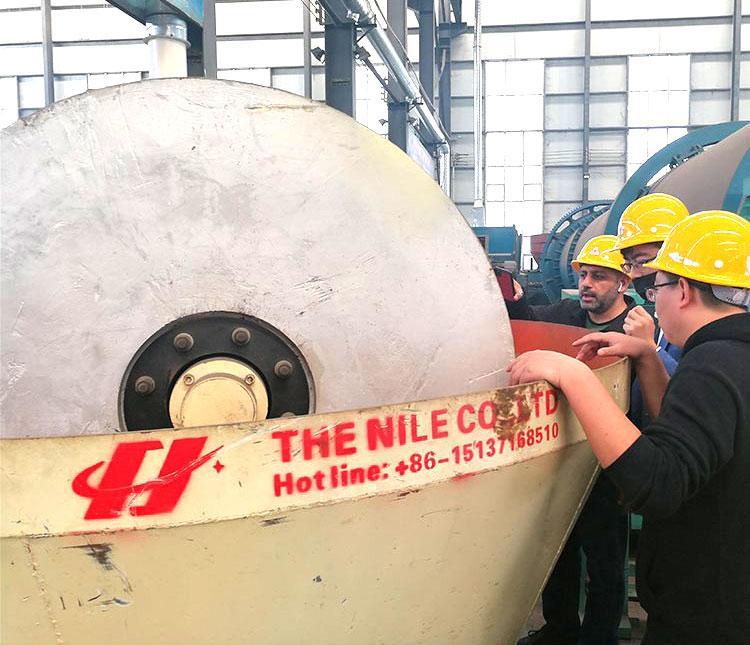Wet Grinding Mill Maintenance Guide
Daily Maintenance
Lubrication Management
Inspect bearings, gearboxes, and gears daily for proper lubrication. Ensure oil levels are adequate and clean.
Replace lubricating oil every 1 month after initial operation, then every 6 months or as per intermediate maintenance schedules. Use high-temperature anti-wear grease to prevent failure due to excessive bearing temperatures (≤80°C) .
 Cleaning and Inspection
Cleaning and Inspection
Remove residual materials from the grinding basin daily to prevent damage from hard debris (e.g., metal fragments).
Check belt tension, bolt tightness, and abnormal vibrations/noises in components.
Periodic Maintenance
Routine Servicing
Weekly: Inspect wear-prone parts (e.g., liners, gears) and replace damaged components.
Monthly: Thoroughly clean internal components, check gearbox wear, main bearing clearance, and adjust grinding roller-to-basin gaps .
Critical Component Maintenance
Bearings: Monitor temperature (max 55°C temperature rise) and noise weekly. Replace if abnormal.
Rollers/Basins: For split-type rollers, replace only worn rings. Basin replacement requires realigning the buffer sand layer and securing the new basin .
Operational Protocols
Pre-Startup: Allow 3–5 minutes of no-load rotation to confirm normal operation. Avoid overloading.
During Operation: Continuous monitoring is mandatory. Halt immediately if vibrations, motor overheating, or abnormal noises occur.
Post-Shutdown: Clear residual materials and conduct post-operation inspections.
Safety Precautions
Assign a dedicated supervisor when inspecting the grinding basin interior.
Avoid bolting the frame to the foundation; use shock-absorbing pads to minimize vibrations .
By adhering to these protocols, equipment reliability and service life can be significantly enhanced. Maintenance intervals may vary based on mill type (e.g., 1600/1200 models) and operational intensity.
Lubrication Management
Inspect bearings, gearboxes, and gears daily for proper lubrication. Ensure oil levels are adequate and clean.
Replace lubricating oil every 1 month after initial operation, then every 6 months or as per intermediate maintenance schedules. Use high-temperature anti-wear grease to prevent failure due to excessive bearing temperatures (≤80°C) .

Remove residual materials from the grinding basin daily to prevent damage from hard debris (e.g., metal fragments).
Check belt tension, bolt tightness, and abnormal vibrations/noises in components.
Periodic Maintenance
Routine Servicing
Weekly: Inspect wear-prone parts (e.g., liners, gears) and replace damaged components.
Monthly: Thoroughly clean internal components, check gearbox wear, main bearing clearance, and adjust grinding roller-to-basin gaps .
Critical Component Maintenance
Bearings: Monitor temperature (max 55°C temperature rise) and noise weekly. Replace if abnormal.
Rollers/Basins: For split-type rollers, replace only worn rings. Basin replacement requires realigning the buffer sand layer and securing the new basin .
Operational Protocols
Pre-Startup: Allow 3–5 minutes of no-load rotation to confirm normal operation. Avoid overloading.
During Operation: Continuous monitoring is mandatory. Halt immediately if vibrations, motor overheating, or abnormal noises occur.
Post-Shutdown: Clear residual materials and conduct post-operation inspections.
Safety Precautions
Assign a dedicated supervisor when inspecting the grinding basin interior.
Avoid bolting the frame to the foundation; use shock-absorbing pads to minimize vibrations .
By adhering to these protocols, equipment reliability and service life can be significantly enhanced. Maintenance intervals may vary based on mill type (e.g., 1600/1200 models) and operational intensity.
